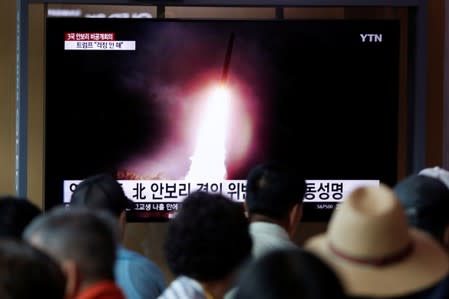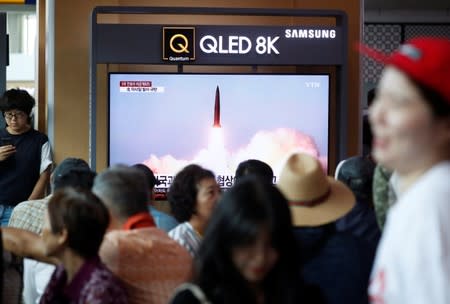Trump sure Kim 'does not want to disappoint his friend, President Trump!'
By David Brunnstrom and Josh Smith
WASHINGTON/SEOUL (Reuters) - U.S. President Donald Trump sought again on Friday to play down North Korea's three short-range missiles tests in eight days, saying they did not break any agreement he had with Kim Jong Un and he was sure the North Korean leader did not want to disappoint him.
In an apparent reference to Kim's pledge not to resume testing of intercontinental ballistic missiles and nuclear bombs frozen since 2017, Trump said on Twitter: "Chairman Kim does not want to disappoint me with a violation of trust."
"There is far too much for North Korea to gain - the potential as a Country, under Kim Jong Un’s leadership, is unlimited. Also, there is far too much to lose," said Trump, who has taken to flattering Kim while also maintaining tough sanctions on his totalitarian country.
Stressing the personal rapport he says he has built with Kim in three meetings since June last year, Trump said: "He will do the right thing because he is far too smart not to, and he does not want to disappoint his friend, President Trump!"
Despite Trump's words, North Korea has embarrassed the U.S. president by testing the missiles even though he and Kim agreed at a June 30 meeting to revive stalled denuclearization talks.
The talks have yet to resume, and analysts believe the tests are designed both to improve North Korean military capabilities and to pressure Washington to offer more concessions.
A summit between Trump and Kim in Vietnam in February collapsed after they failed to reconcile differences between U.S. demands for North Korea's complete denuclearization and Pyongyang's demands for relief from punishing sanctions.
Trump said on Friday the short-range tests "may be a United Nations violation," but he and Kim had never discussed such missiles.
North Korean short-range missiles pose no threat to U.S. territory, but they do put at risk U.S. allies Japan and South Korea and the tens of thousands of U.S. troops stationed there.
Testing of such missiles is covered by a 2006 United Nations Security Council resolution demanding that North Korea suspend all activities related to its ballistic missile programme.
The North Korean Foreign Ministry said Pyongyang had always rejected "illegally fabricated" U.N. resolutions. The decision to suspend ICBM and nuclear tests was taken out of "goodwill and consideration for (a) dialogue partner," a ministry statement said.
"It is by no means part of acts to recognise and abide by the UNSC's absurd "resolutions," it said.
North Korea criticized Britain, France and Germany who issued a statement after a closed-door U.N. Security Council meeting on Thursday urging North Korea to engage in "meaningful" talks with the United States and saying that sanctions need to be fully enforced until Pyongyang dismantles its nuclear and ballistic missile programs.
The North Korean statement accused the U.N. Security Council of "groundlessly slandering" Pyongyang's development of conventional weaponry "while turning blind eyes to the war exercises in south Korea and shipment of cutting-edge attack weapons into it."
North Korea has demanded that the United States and South Korea call off joint military drills planned for this month, saying they would violate a pledge by Trump to Kim, also criticizing Washington's supply of new weapons to Seoul.
Pyongyang has also warned of a possible end to its freeze on nuclear and long-range missile tests, which Trump has repeatedly held up as evidence of successful engagement with Kim.
HOPES FOR TALKS
U.S. officials are still hoping to revive talks and U.S. Secretary of State Mike Pompeo said on Friday that while the diplomatic process might have some bumps, conversations with North Korea were "going on even as we speak."
A senior State Department official briefing reporters called the North Korean launches "provocations," but said such acts had always been part of Pyongyang's negotiating playbook.
"We're expecting in the not too distant future, we'll be back in a sustained negotiating process," the official said. He said no time or place had been set for new talks.
The official also appeared to warn against larger North Korean tests, saying: "There are provocations that would potentially result in a more consequential response from the rest of the countries in the world."
Another U.S. official, also speaking on condition of anonymity, said that in the latest tests, North Korea fired two short-range ballistic missiles and described them as KN-23s, the same type launched in the two previous tests since July 25.
They flew 220 km (135 miles) and reached an altitude of 25 km (15 miles), South Korea's Joint Chiefs of Staff (JCS) said.
North Korean state media has described the weapons as a new large-calibre, multiple-launch guided rocket system and said Kim oversaw the previous launch on Wednesday.
NORTH KOREAN DEMANDS
Kim's government was assiduously improving military capabilities while signalling negotiating demands, said Leif-Eric Easley, an international relations expert at Seoul's Ewha University.
"The aim is not only to increase Pyongyang's ability to coerce its neighbours, another goal is to normalise North Korea's sanctions-violating tests as if they were as legitimate as South Korea's defensive exercises."
Some analysts believe Kim will have been emboldened to press more aggressively for concessions given Trump's apparent eagerness to hold up his North Korea policy as a success in his 2020 re-election bid.Pompeo said U.N. sanctions on North Korea remained fully in place.
He said he was disappointed that his North Korean counterpart cancelled a trip to regional meetings he attended this week in Bangkok.
"It would've given us an opportunity to have another set of conversations and I hope it won't be too long before I have a chance to do that."
Andrei Lankov of the Korea Risk Group think tank said the missile tests did not mean Pyongyang was not interested in talks with the United States.
"On the contrary, the choice of the short-range missile is a sign that, for the time being, Pyongyang remains serious about making a deal with the U.S.," he wrote in a report for the NK News website.
(Reporting by David Brunnstrom in WASHINGTON and Josh Smith in SEOUL, Hyonhee Shin and Patpicha Tanakasempipat in BANGKOK, Phil Stewart, Alexandra Alper and Idrees Ali in WASHINGTON, Michelle Nichols in NEW YORK, and Kaori Kaneko in TOKYO; Editing by Paul Tait, Clarence Fernandez and Grant McCool)



